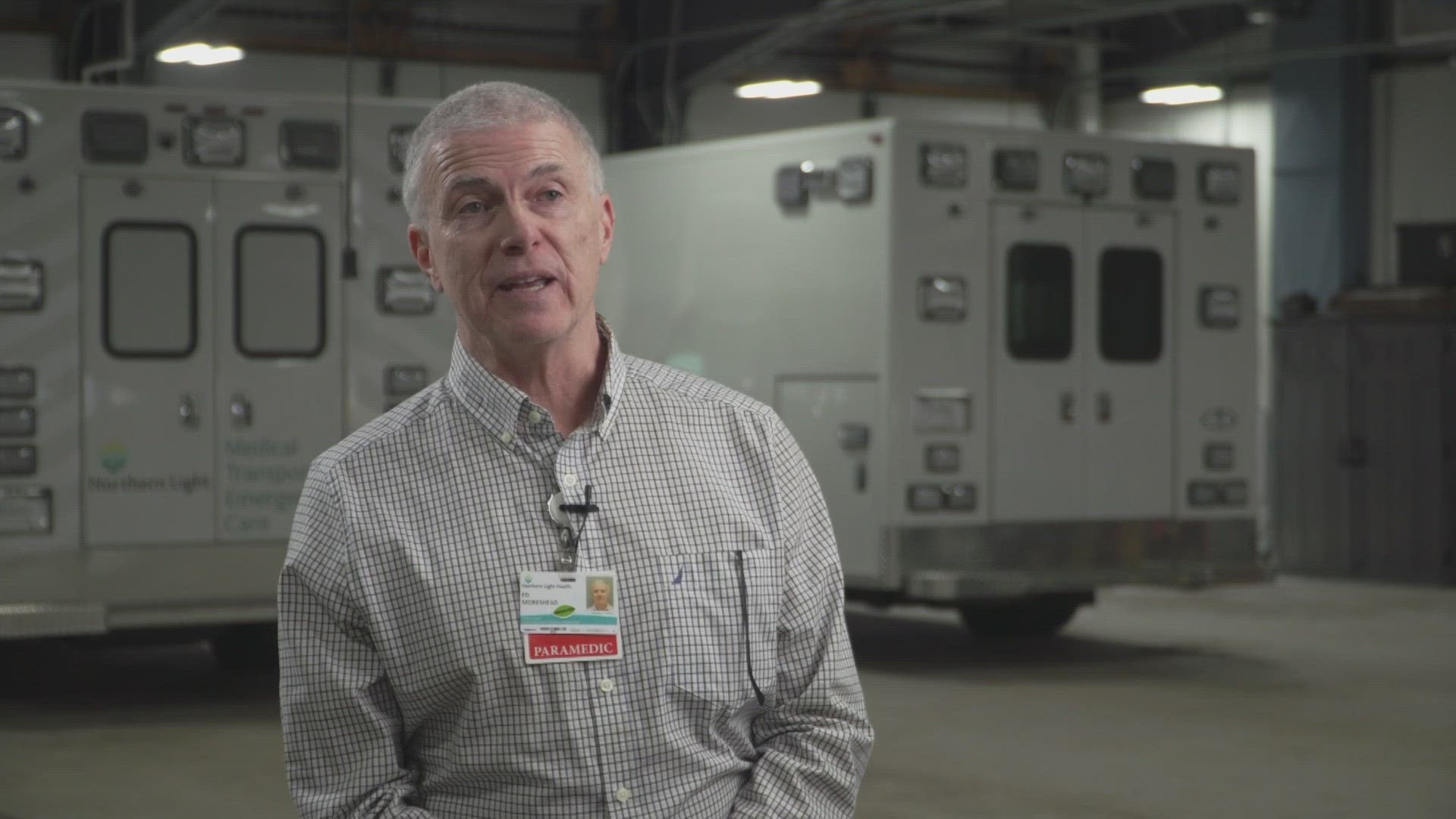BANGOR, Maine — Unaware that he was bleeding from the inside, a gastrointestinal bleed left Northern Light paramedic Ed Moreshead just hours away from what could have been his death last February.
After needing 10 units of blood to survive, Moreshead now doesn't miss an opportunity to remind people why donating blood is so important.
"I was bleeding in my small intestine," Moreshead said.
Moreshead has been a paramedic for nearly four decades, and between providing aid to patients in LifeFlight helicopters and performing lifesaving care for others in the back of ambulances, he has witnessed several people make close encounters with death.
He never thought that he would become the patient needing care, nor could he have ever imagined having to rely on the available amount of blood supply resources in Maine to save his life.
"I've been a medical professional for almost 40 years. I had no idea," Moreshead said. "No idea whatsoever until the morning that I went to the floor because my blood pressure was so low."
As a paramedic, Moreshead works 48-hour shifts. He said after completing his shift one night last February, he started to feel sick. He said he felt progressively worse as the morning came.
But it wasn't until he tried to walk to the bathroom that everything took a turn for the worst. Moreshead said he passed out in his bathroom.
Managing to regain consciousness, Moreshead called his wife for help. Paramedics arrived in an ambulance he said, hoping to save his life—something he has done for many people throughout his career.
"I received 10 units of blood over five days," Moreshead said. "Your body only holds 10 units of blood."
Statistics from the American Red Cross show that one in seven people who are admitted to a hospital need a blood transfusion, but only three percent of age-eligible people donate blood yearly.
"When we hit 10 units? That's what we call a massive transfusion," Northern Light Trauma Medical Director Amy Fenwick said. "That's a severely injured patient."
American Red Cross statistics explain that a single car accident victim can use as many as 100 pints of blood. To get 100 pints of blood, 100 people would have to make a blood donation.
For Moreshead, help couldn't wait if 10 blood donors hadn't decided to give blood at local blood drives.
"Those ten people who I'll never know and who will never know me, they saved my life," Moreshead said.
Fenwick said very often, family members ask her in the midst of an emergency if they can donate blood to their loved one who is in need. She said, unfortunately, it doesn't work that way.
Blood has to be cleaned, tested, matched, and carefully examined to make sure that it is safe to be used. Finding a matching blood type is also a task.
"If you happen to unfortunately roll through these doors unconscious needing blood, someone else has already delivered it for you," Fenwick said.
According to Fenwick, four units of blood at a time are stored in each trauma room in the hospital's emergency department—getting replenished as units are used. But when the blood bank is low, workers in the blood bank reach out to suppliers, like the American Red Cross.
"We need the blood on the shelf," American Red Cross director for northern and eastern Maine Caroline King said.
When blood isn't on the shelf and available for the American Red Cross to deliver to hospitals, medical professionals have to make tough decisions, deciding who needs the blood supply most from patient to patient.
"Whole blood is not something that we can make or manufacture," King said. "Sometimes when the blood supply is short, we don’t give them everything they ask for, and we cross our fingers and hope because we can’t give them what we don’t have."
King said she's hoping all of the slots for the upcoming blood drive on March 27 are filled.
NEWS CENTER Maine partners with the American Red Cross yearly to host the blood drive.
With blood only having a shelf life of 42 days, the blood supply needs constant replenishment. Doctors and emergency responders say they are always counting on people to donate blood to make sure enough blood is available when someone is in need.
After needing the lifesaving resource from strangers, Moreshead said he is hoping donors will sign up to help save lives.
"Without the blood, people would die," he said. "Don't think it can't happen to you. Don't think that you're a super person that will never need blood or never need medical care. Because if you make the effort today, someone will make it for you."
To schedule an appointment to give blood at the blood drive, click here.
You can also text the word "BLOOD" to 207-828-6622.

